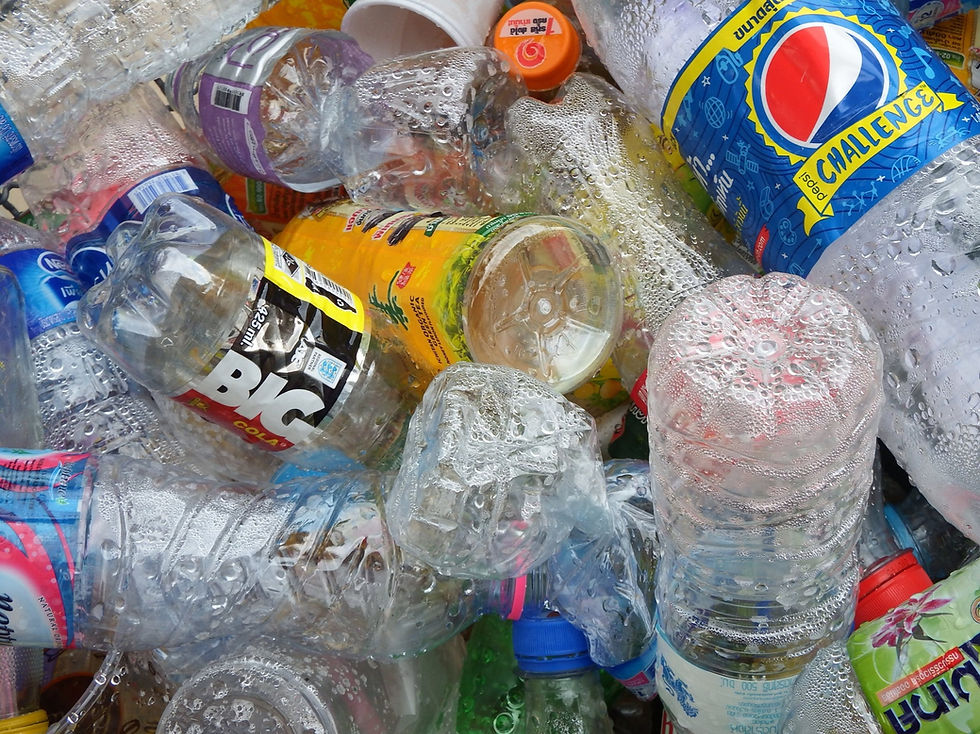10 Ways To Reduce Plastic Waste
- gogreengofuture

- Mar 13, 2020
- 3 min read
Updated: Feb 9, 2021
We can't go a day without plastic. That's our reality.
We can't go a day without being conscious and cautious of our plastic waste. That can be our new reality.
300 million tons of plastic are produced yearly. Of that staggering number, half are single-use plastics that cannot be recycled.
Plastic can take anywhere from 10 to 1000 years to biodegrade. For example, a plastic bottle takes about 450 years to decompose, which would mean plastic bottles produced today will be around for the next 15 generations!

A lot of the issue with unsustainable plastic production and pollution of the oceans comes from packaging. Luckily, we are the consumers of the packaged products and therefore we can generate change by consciously deciding against plastic.
Here's How:
1. Switch your bottled liquid shampoo, which can take up to 1000 years to biodegrade, for a packaging-free shampoo bar. Check out these cool shampoo bars from Lush.

2. When in a restaurant or bar refuse a straw with your drink. Straws cannot be recycled and are therefore single-use plastics. They either take about 200 years to decompose in landfills or due to their lightness get carried into the oceans, creating a risk for marine life.
3. Another issue is take-out. It often comes in a styrofoam container, a type of plastic that cannot decompose. You could bring your reusable container and ask the restaurant to use that for your doggie-bag instead.
4. When you stop by your local café in the morning before work and get a takeaway coffee you are contributing to the 2.7 million takeaway coffee cups thrown out every day in Australia. They consist of both paper and plastic making them difficult to recycle. So, to avoid all of this you could bring your reusable coffee cup, which most cafés are happy to fill up.

5. You can invest in some reusable beeswax wraps for storing food or packing your lunch etc.. This way you can avoid cling wrap, another single-use plastic.
6. Get a reusable water-bottle, that you can use time and time again! If you prefer sparkling water you can invest in a SodaStream and DIY at home. Either way, you will save money and create positive change for the environment.

7. It's time to make the switch to some re-useable shopping bags if you haven't already. Plastic bags have been completely banned in Kenya and two American states. Many other countries have put strict laws on the single-use plastic and don't hand out free plastic bags anymore. Click here to sign a petition to ban single-use plastics in Australia by 2020.
8. Try to buy foods with less or no packaging at all. This is a really easy swap, especially with fresh fruit and vegetables. Consciously choose loose vegetables over packaged ones. Or buy things in bulk so the ratio of item to packaging decreases.
9. You've heard this time and time again, but it can't be urged enough. Recycle. If you can't steer clear from plastic completely you should recycle as much as you can. That way it won't end up in landfills, all the energy invested into making the plastic won't go to waste and it can be given a second life. Here's a guide to which plastics can be recycled.

10. If you see rubbish on the floor pick it up. Whether it's yours or not, simply pick it up. It takes less than a minute and could save an endangered sea-turtle, fish or bird. About 80% of plastic debris in the sea comes from the land. It can be carried from the land by wind, rain, and waterways. Animals can get tangled in it or ingest it. They might mistakenly think it's prey or ingest smaller pieces unknowingly. Studies have shown that the debris can fill up an animal's stomach, therefore its potential for food intake is limited and the animal becomes weak. The chemicals in the plastic can also leach into the animal's body causing reproductive issues. There are approximately 267 species that have been negatively impacted by plastic in the oceans.
So, the next time you go to the beach or anywhere for that matter remember to Take 3 For The Sea.



Comments